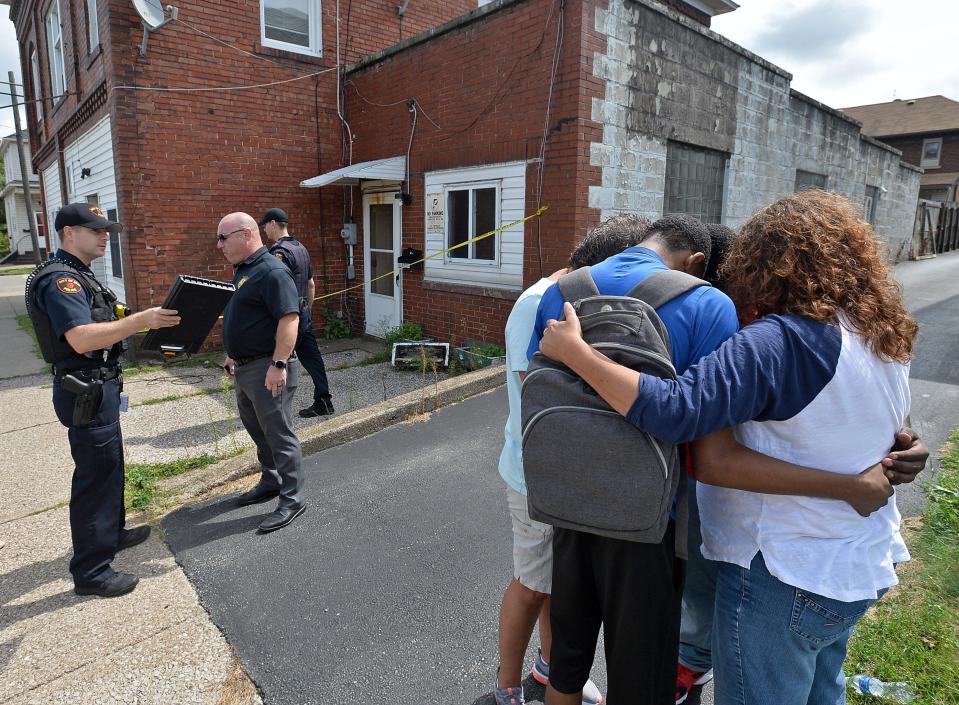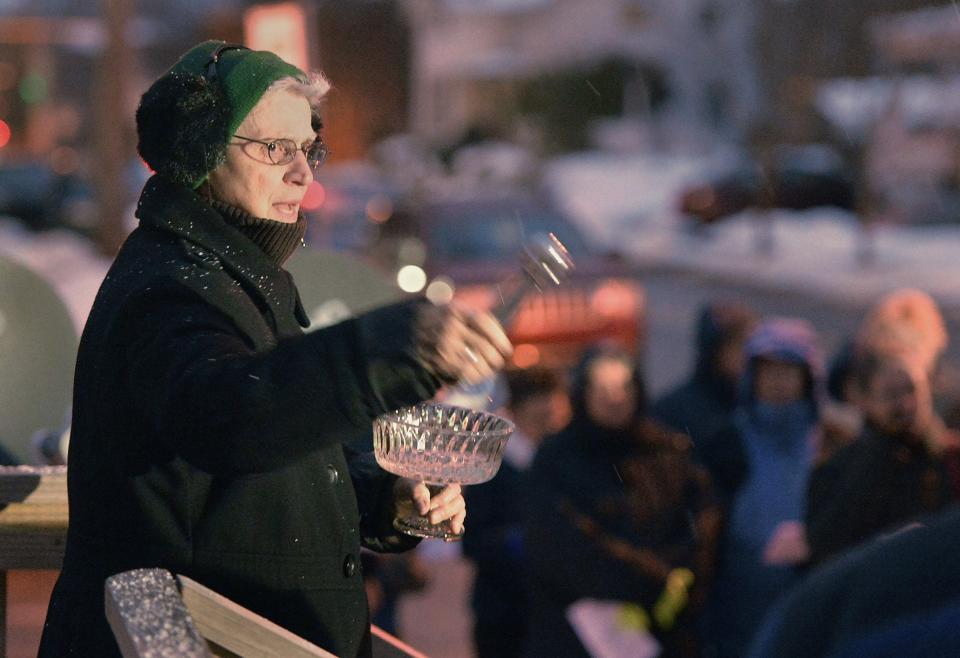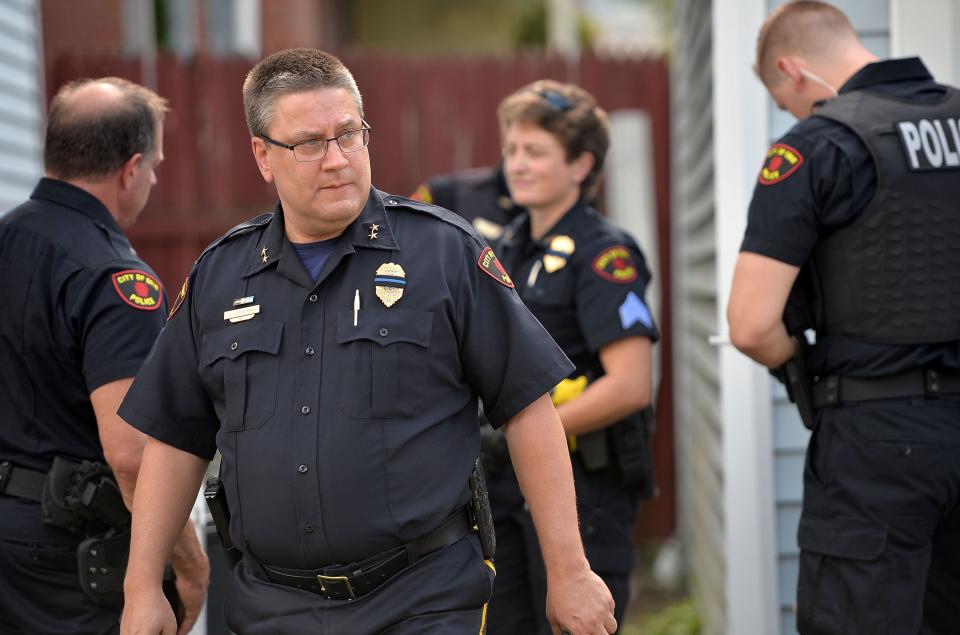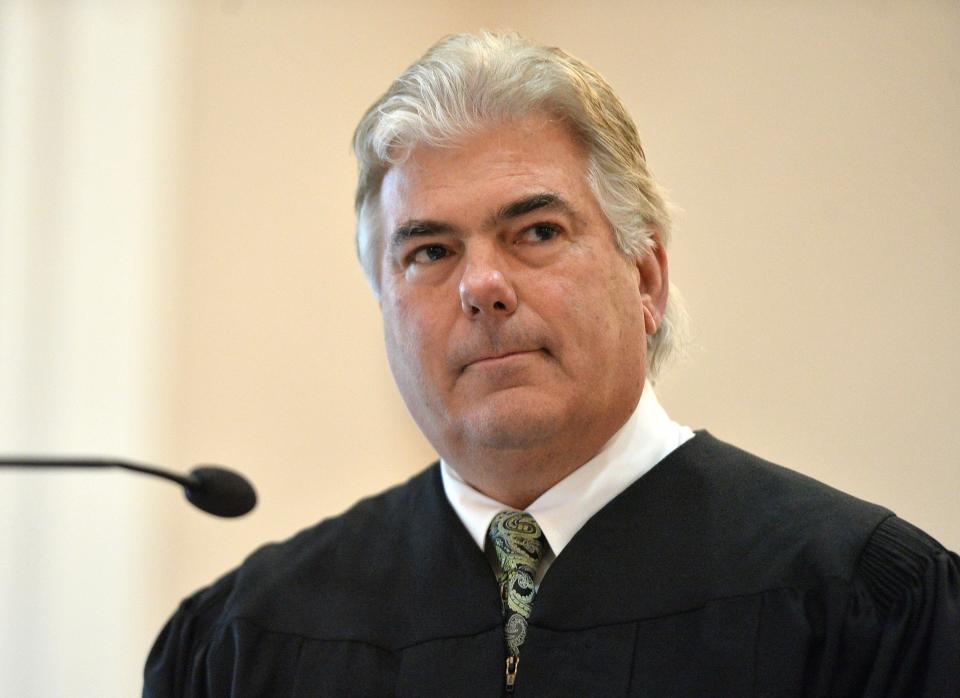3 sentenced in deadly Erie crime spree: life, 77-154 years and 45½ to 91 years
Only one of the three defendants convicted in a deadly crime spree in Erie in 2018 faced a mandatory term of life with no parole when he appeared for sentencing in Erie County Common Pleas Court.
But the other two defendants, who appeared at the same hearing, ended up getting what could be considered life or near-life sentences.
One of them was sentenced to 77 to 154 years in state prison.
The other got 45½ to 91 years.
The three defendants are Raeshawn D. McCallum, 24, who got life with no parole plus up to 88½ years; Destin A. Dortch, 22, who got up to 154 years; and Christopher J. Bridges, 22, who got up to 91 years.
McCallum was 18 when the crimes occurred. Dortch was 17 and Bridges was 16.

McCallum, Dortch and Bridges were convicted in November in the fatal shootings and robberies of two drug dealers and in a home-invasion robbery, all in the summer of 2018.
"Horrible offenses," said Judge David Ridge, who sentenced the three.
One of the murder victims was 24-year-old Calvin Isaiah, shot as as he was in bed in his apartment at East 26th Street and Pennsylvania Avenue on Aug. 29, 2018. His place had been was ransacked, and someone had knocked out ceiling tiles in search of something.
The other murder victim was Phillip Anthony Clark, 44, who used a wheelchair because he was left a paraplegic after he was shot in 1997. He was shot to death on Sept. 4, 2018, as he sat, naked, on the toilet in his apartment in the 300 block of West 29th Street, near Cochran street.
The home invasion robbery occurred Sept. 3, 2018, at a residence in the 1100 block of West 20th Street, between Raspberry and Cranberry streets.
The series of crimes shocked Erie, sent the Erie police scrambling for clues and led to a two-week trial that ranks as one of the longest and most complex criminal trials at the Erie County Courthouse in recent years. The three were convicted of first- and second-degree murder and other crimes on Nov. 2.
The crime spree left Ridge, who presided at trial, at a loss for words at the joint sentencing for the McCallum, Dortch and Bridges, on Thursday.
"I wish I had some ability to explain how these events can occur in our community or any community," Ridge said in court. "It is beyond comprehension."
Smirks, and then judge delivers sentence
McCallum and Dortch smirked during the sentencing hearing. The lead prosecutor, Chief Erie County Deputy District Attorney Jeremy Lightner, referred to their behavior in court as he asked Ridge to impose stiff sentences.
Ridge noted the smirks, and he noted that McCallum and Dortch declined to address him and express remorse before he sentenced them.
Only Bridges, who was convicted of the fewest charges among the three, spoke in court. He said he disagreed with how the prosecution portrayed him and he asked his sister, who was in the gallery, to help take care of their mother. Bridges then turned to the families of the victims seated in the gallery.
"To the families, I send my condolences," Bridges said. "Keep your head up, too."
Of the three defendants, Bridges was the youngest and had the most stable family background, Lightner said. He said Bridges was nonetheless an active member of the deadly trio.
"Although you were the youngest, you were directly involved in these incidents," Ridge said.
Judge adds decades to McCallum's life sentence
Ridge added more time to McCallum's mandatory life sentence with no parole, which he got for his conviction for first-degree murder, a premeditated killing. The additional time accounted for the slew of other crimes for which McCallum was convicted.
McCallum's total sentence is life with no parole plus another 44 years and three months to 88½ years.
Ridge sentenced him for first-degree murder in Clark's death, for burglary and related charges in a break-in at Isaiah's apartment the day before he was killed and for the home-invasion robbery. McCallum also got time for his conviction for shooting a victim in the leg and robbing him of a necklace and a watch at East 23rd and French streets during the day on June 18, 2018.

In sentencing McCallum to life with no parole, Ridge said: "It is not something I welcome. It is also something that is necessary and appropriate."
The crimes McCallum was convicted of committing, Ridge told him, were "calculated" and done "with a coldness rarely seen."
Though charged as juveniles, 2 defendants tried as adults
Bridges and Dortch were tried as adults though they were juveniles when the crimes occurred. Their ages at the time of the crimes spared them from mandatory life sentences with no parole — but their ages at the time of the crimes did not spare them from lengthy sentences.
Ridge sentenced Dortch to 77 to 154 years for first-degree murder in Isaiah's death, for second-degree murder in Clark's death and for burglary and related charges in the break-in at Isaiah's apartment the day before he was killed.
Dortch was not accused of killing Isaiah but was convicted of second-degree murder being there during the murder and robbery. The prosecution said the evidence showed Dortch had a gun that, unknown to him, was missing a firing pin and did not work.
Because he was a juvenile when the crimes occurred, Dortch faced a mandatory minimum sentence of 35 years for first-degree murder and 30 years for second-degree murder, a killing committed during a felony, such as a robbery. He would have faced a mandatory sentence of life with no parole for second-degree murder had he been 18 or older when the crimes occurred.

Ridge gave Dortch 40 to 80 years for first-degree murder, 35 to 70 years for second-degree murder and another two to four years for other crimes.
Ridge sentenced Bridges to 45½ to 91 years for second-degree murder in Clark's death based on the allegation that he was at the robbery but did not kill Clark. The prosecution said the evidence showed that his gun malfunctioned. He was also found guilty of burglary and other charges in the home-invasion robbery.
Ridge gave Bridges 35 to 70 years for second-degree murder and another 10½ to 21 years for the other crimes.
Dortch and Bridges must serve the minimum sentences before they will be eligible for parole.
By the time that occurs, Dortch will be 99 and Bridges about 67.
Prosecutor says lengthy sentences warranted for all 3
The prosecutor, Lightner, called for the lengthy sentences. He reiterated what he said at trial: that McCallum, Dortch and Bridges committed the crimes as a kind of right of passage to show that they were to be feared on Erie's streets — a "gang-style graduation," as Lightner said at trial.
"What occurred in this string of crimes were not mistakes of young men making rash decisions," Lightner told Ridge on Thursday.
Speaking of McCallum, Lightner said: "This is not a person who wanted a good life and lost his way. He wanted this life. He wanted to say that he killed people."
Lightner repeatedly returned to the circumstances of the death of Phillip Clark, who was shot as he was in his wheelchair, partially paralyzed. Lightner wondered how someone could shoot a person as incapacitated as Clark.
"How does that happen in a society that we want to believe in?" Lightner said.
As he did at trial, Lightner pointed out that McCallum himself now uses a wheelchair because he was shot. McCallum was shot after the crimes occurred in the summer of 2018.
'What he did that day was evil, everything that we hope humanity is not," Lightner said, referring to McCallum fatally shooting Clark.
"I cannot think of a person whom a life sentence is more appropriate for than Raeshawn McCallum," Lightner said.
Victims' families mourn, tell judge of their loss
The victims families also asked for stiff sentences for the defendants.
The father of Calvin Isaiah, Erie County Councilman Andre Horton, stood side by side with his wife, Angella, as they told Ridge how Isaiah's death had left them bereft and strained their family.
"We miss Calvin's joy, his sense of humor, his very essence," Angella Horton said. "So much is left undone with his passing."
Andre Horton asked for a sentence that would "hold those accountable" for his son's death.
"This is by far one of the most disturbing things I have seen in this community," he said.
Clark's sister Selena Clark said her brother was studying to become a minister. She said his murder erased his chance to turn his life around fully.
"He was changing," Selena Clark told Ridge.
She said her brother, known as Tony, had a heart — unlike, she said, the three defendants convicted in his murder.
"I just want them to get what they deserve," Selena Clark said.
Defendants described as among Erie's most dangerous
The defendants' lawyers had little room to argue, given the mandatory life sentence for McCallum and the mandatory minimum sentences for Dortch and Bridges.
The lawyers — Keith Clelland for Bridges, Bruce Sandmeyer for Dortch and Jason Nard, of Pittsburgh, for McCallum — asked Ridge to limit the amount of time their clients received by running the sentences concurrently for many of the crimes.
Ridge largely rejected that request. He said he ordered mostly consecutive sentences to make sure the overall sentence accounted for the harm done to all the victims.

As they did at trial, the defense lawyers suggested that the defendants acted not alone, but at the direction of two codefendants who agreed to cooperate with the prosecution and testify against McCallum, Dortch and Bridges. Those cooperating codefendants are Chinello Blaski, 43, and Nicholas Grayson, 32, who are awaiting prosecution.
The cooperation of Blaski and Grayson was critical to the investigation of the crime spree.
The Erie police built a case against Bridges, Dortch and McCallum using DNA, fingerprints and social media posts help support what Blaski and Grayson told investigators. The gradual accumulation of evidence led police to charge the three defendants in 2021.
Blaski and Grayson were also charged, but are expected to get consideration from the District Attorney's Office as a result of their cooperation — to the consternation of the lawyers for McCallum, Dortch and Bridges.
"These two criminal adults influenced teenagers in this case," Sandmeyer told Ridge on Thursday.
Lightner responded that Blaski and Grayson were "professional robbers" who stole from drug dealers without harming them.
He said Blaski and Grayson, though criminals, nonetheless operated under the strategy that the targeted drug dealers would not report the robberies to the police because of the dealers' own criminal activity. Blaski and Grayson reasoned the police would get involved only if the targeted dealers were severely injured or killed, Lightner said.
On the street, robberies of drug dealers were called "licks" or "stings"
Lightner said even Blaski and Grayson could not countenance that McCallum, Dortch and Bridges killed the trio's targets during the robberies. Those concerns were part of the reason Blaski and Grayson agreed to cooperate, according to the prosecution.
"These cold-blooded people were horrified by what these young people were doing," Lightner said.
He called MCallum, Dortch and Bridges — 16,17 and 18 at the time of the killings ― "the top two or three dangerous people we have ever seen."
Contact Ed Palattella at epalattella@timesnews.com. Follow him on X @ETNpalattella.
This article originally appeared on Erie Times-News: 3 sentenced in deadly Erie PA crime spree: life and hundreds of years

